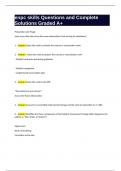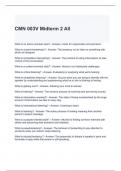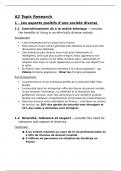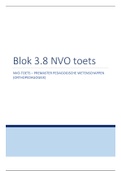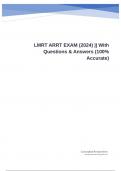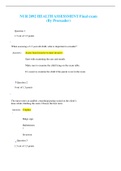Inleiding
Deel 1
Door vaardigheden te oefenen word je beter in bewegen. Door oefening en ervaring ben jij je bewegingen anders gaan aansturen. Je
hebt iets geleerd. Maar wat verandert er precies tijdens een leerproces? En hoe kun je dit leerproces beïnvloeden zodat het
leerproces zo optimaal mogelijk verloopt?
verschillende perspectieven op de manier waarop mensen hun bewegen sturen en dus ook op de manier waarop het
verbeteren van deze bewegingssturing plaatsvindt.
Deel 2
Op geen enkel moment vinden er zulke grote veranderingen plaats in de motoriek als in de vroege kindertijd. In het eerste twee
levensjaren breidt het bewegingsrepertoire zich uit van spontane motoriek (bv trappelen van de beentjes) en ‘reflexmatige’ activiteit
naar het ontdekken van de omgeving door objecten te pakken en te bekijken, te kruipen en te lopen. In de loop van de kindertijd
richting puberteit kunnen kinderen steeds complexere vaardigheden uitvoeren en hun bewegen steeds beter afstemmen op de
omgeving. Welke factoren zijn verantwoordelijk voor deze indrukwekkende verandering? Hoe ziet deze verandering eruit? En hoe
en in hoeverre kan deze ontwikkeling worden beïnvloed door ouders, leraren e.d.?
Cursusdoelen
Na het doorlopen van deze cursus ben je in staat om:
- een omschrijving te geven van de begrippen motorisch leren en motorische ontwikkeling en of/hoe deze
begrippen aan elkaar zijn gerelateerd;
- van de volgende theoretische benaderingen (behaviorisme, informatieverwerkingsbenadering, sociale
leertheorie, ecologische psychologie, dynamische systeembenadering) toe te lichten:
o hoe het leren van motorische vaardigheden plaatsvindt;
o wat hun sterkten en zwakten zijn;
o welke invloed deze benaderingen hebben op de hedendaagse sport- en bewegingspraktijk;.
o welke relaties bestaan met hedendaagse onderzoeksthema’s, zoals impliciet/expliciet leren,
observationeel leren, invloed van variatie, instructie, feedback, zelfsturing, taakmoeilijkheid;
- van de volgende benaderingen (ontwikkelingstheorie Jean Piaget, rijpingstheorie, leer- en
informatieverwerkingsmodellen, dynamische systeemtheorie, ecologische psychologie) toe te lichten:
o welke factoren ontwikkeling bepalen;
o hoe motorische ontwikkeling plaatsvindt;
o of/hoe motorische ontwikkeling beïnvloed kan worden;
o wat hun sterkten en zwakten zijn;
o welke invloed deze benaderingen hebben op de hedendaagse sport- en bewegingspraktijk;
- uit te leggen welke relatie er is tussen motoriek en cognitie vanuit het perspectief van ‘embodied cognition’;
- de fysieke en motorische ontwikkeling (van baby tot en met de puberteit) in grote lijnen te beschrijven.
- vanuit de behandelde onderzoeksthema's voorbeelden te geven van de manier waarop het motorisch
leerproces en motorische ontwikkeling (effectief) kunnen worden beïnvloed;
- onderbouwde voorstellen te doen voor concrete oefensituaties die het doel hebben het motorische
leerproces en/of de motorische ontwikkeling te ondersteunen.
,Inhoud
Motorisch Leren en Ontwikkelen....................................................................................................................................1
Inleiding.......................................................................................................................................................................1
Cursusdoelen...............................................................................................................................................................1
Hoorcollege 1: inleiding motorisch leren.........................................................................................................................4
Hoorcollege 2: Dynamische systeemtheorie & niet-lineaire pedagogiek......................................................................14
Hoorcollege 3 - Impliciet en expliciet leren & de rol van verbale informatie................................................................22
Werkcollege 2 – impliciet en expliciet leren en de rol van verbale informatie..............................................................29
Hoorcollege 4 - Behaviorisme, sociale leertheorie & observationeel leren...................................................................31
Hoorcollege 5 - informatietheoretische benadering & de rol van feedback en taakmoeilijkheid.................................38
Hoorcollege 5 & 6 – contextual interference en challenge point framework................................................................43
Hoorcollege 6 - informatietheoretische benadering & de rol van afwisseling en variatie.............................................46
Hoorcollege 7 – ecologische psychologie en perceptueel-motorisch leren...................................................................50
Hoorcollege 8 – inleiding motorisch ontwikkelen.........................................................................................................56
Hoorcollege 9 - Beschrijvende periode: Gesell, McGraw & Piaget................................................................................63
Hoorcollege 10 – Beschrijving motorische ontwikkeling...............................................................................................71
Hoorcollege 11 – verklarende periode: dynamische systeembenadering.....................................................................77
Hoorcollege 12 - Verklarende periode: Ecologische psychologie & embodied cognition..............................................82
Werkcollege 3................................................................................................................................................................86
Responsiecollege...........................................................................................................................................................89
,Deel 1
Motorisch leren
, Hoorcollege 1: inleiding motorisch leren
Davids, K. Button, B., Benett, S. (2008). Dynamics of skill acquisition: a constraints-led approach. Champaign: Human kinetics; Chapter 1: Traditional Theories of Skill Acquisition:
Motor skill acquistion (vaardigheid verwerving)
Motorisch leren (schmidt) = proces dat leidt tot relatief duurzame veranderingen in het gedrag(spotentieel) als
gevolg van specifieke ervaringen met de omgeving.
- Interact effectively with environment
- Detect important information
- Time our responses appropriately
>> It should result in coordination patterns that are adaptable to a range of varying performance characteristics
Acquisition is different from execution in a way that learning is a gradual process that occurs over many attempts,
resulting in behaviour that is less vulnerable to transitory factors, such as fatique
Power law of practice
= states that performance improves with practice, although there are eventually physical limits to this relationship
- in het begin leer je heel snel, meer naar het eind van het leerproces gaat het veel langzamer; het toont geen
lineaire lijn.
slechte theorie want leren gaat nooit in zo’n vloeiende lijn (pieken + dalen)
- Failed to gain universal acceptance because it became clear that
learning is often charachterized by sudden jumps, rapid
improvements and even decrements in performance over time
10.000 uur regel; om uit te blinken in iets moet je 10.000 uur
geoefend/getraind hebben om uiteindelijk tot de top te kunnen behoren
(aanleg en intelligentie spelen waarschijnlijk echter een grotere rol dan
oefening
5 traditional theoretical approaches to skill acquisition:
1 Association theory (skinner)
Were interested in movement stimuli (information) & action
o Employed relatively simple repetitive movements for testing
o Findings indicated the important role that feedback plays in reinforcing learning
Association theories typically lacked explanation to account for the fact that humans can choose when &
how to moderate their actions, and they failed to explain that sensory feedback was not always essential for
executing some movements, as in the case of rapid reactive actions
2 Neuromaturational theories
Motor development
= behavioral changes are typically atributed to growth and/or motivation
Motor learning
= behavioral changes are typically attributed to practice and/or experience
Theorists suggested that the maturation of the CNS (central nervous system) was the catalyst for the development of
new movement skills and the gradual dissapearance of older, less functional movements caused by early reflex or
motor babbling
Nowadays, they believe that variatons reflect the unique interaction between personal characteristics and the
specific environmental context in which each person develops.

